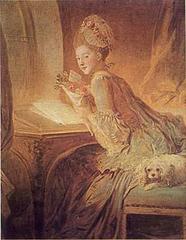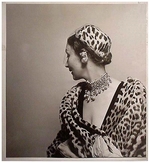Billet Doux by Fragonard {Perfume Review & Musings}

Billet Doux (Love Letter/Note) is the latest release by Fragonard, to celebrate the 80th Anniversary of the perfume house. It is a re-edition and an adaptation of an original fragrance from the 1950s from the house's catalogue. The name of the perfume itself was inspired by a painting bearing the same name by Jean-Honoré Fragonard; the house was named after the painter. According to Fragonard, Billet Doux "... pays homage to the most beautiful flowers of the French Riviera: Sweet William carnation, peony and frangipani with accords of bergamot, lemon and mandarin all on a soft background of cedar, vanilla and musk".

Billet Doux is a priori a soft carnation fragrance offering discreet but unexpected developments thanks to the significant additions of frangipani and orris. It evolves from being soft, powdery, and gently spicy to being creamy, mellow, and discreetly lush, then rootey.The contrast between these different stages of the development gives it its character. The drydown is a light combination of deliciously understated vanilla and faintly smokey cedar wood with rootey overtones with the orris peaking through much later in the drydown...
In the opening, the Sweet William carnation offers its spicy accents reminiscent of clove accompanied here by understated candy-sweet overtones and more marked citrusy ones, the bergamot, lemon and mandarin. The carnation is gentle, powdery, and soft. One can also feel the woods readily. It is reminiscent of Terracotta Guerlain Voile d'Eté in this first stage. An animalic base comes through; it is listed as a musk note but to my nose it smells a little bit dirtier, like civet. The piquancy of the carnation here is counterbalanced by the round and mellow note of frangipani which rounds off the fragrance.
The middle stage of the perfume is creamy as the frangipani takes center stage lightened up by citrus notes and discreetly enlivened by the spicy carnation which are now in the background. The drydown presents an interesting contrast between cedar and vanilla making it smell a bit like wet chalk or clay, in a good way. It turns into a lovely and not-to-sweet vanilla dominated skin scent thanks to the cedar and a rootey note which impart some of its smokiness, dryness and sobriety to the quite subtle vanilla. Further along, the drydown makes me think decidedly of a light creamy dessert with eggs in it, in which chalk would have been added as a softening ingredient like it is done in Indonesian cookery. I find that the cedar note continues to pique my interest all along as it smells rather unconventional in this context. The powderiness in this perfume is a little unusual as it has a creamy facet to it and makes me think, as I already said, more of a humid bit of chalk than of a powder box. The longer drydown turns Billet Doux into an orris scent. The perfume appears to be both an understated and contrasted scent.
It is interesting to see that just like with the recent re-edition of Baghari by Piguet, we are offered an adaptation of a 1950s fragrance. In both cases they turn out to be soft powdery white florals with a little soapy sharpness to them. These last two perfumes can be linked not because they smell similar but because they belong to the same family of fragrances. Billet Doux, as indicated by its name in French is particularly soft, more so than Baghari. If there are any aldehydes in Billet Doux, they are much more toned down; I say this as I find the perfume to be discreetly heady and so would not be surprised if there were aldehydes in it.
Billet Doux will please people who are looking for discreet and soft scents and who enjoy a little vintage feel. The price for the perfume is a steal at only 45 Euros for an interesting gold flacon which seems to be a cross between an Art Deco vase and an Antique urn. It is a Romantic gift idea that would be not too risky as the fragrance is understated. Billet Doux looks very much like a fragrance a man would offer a woman in the 1950s. The fragrance is already available for purchase from the Fragonard site here.










Helene, I think this sounds pretty much perfect, from the Terracotta reference, through the animalic part, on past the carnations and into the rooty smokiness!